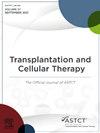重塑护理人员研讨会论文集:解决护理人员对造血细胞移植的要求。
IF 4.4
3区 医学
Q2 HEMATOLOGY
引用次数: 0
摘要
由nmdp赞助、PCORI(以患者为中心的结果研究所)资助的项目,共同重塑护理,参与解决护理人员需求障碍,是一系列研讨会,旨在召集和吸引不同的利益相关者群体,促进对护理人员需求的挑战和解决方案的讨论,并制定PCOR/比较有效性研究(CER)议程,为替代同种异体后造血细胞移植(alloHCT)模型提供证据,以改善护理的可及性。本文回顾了第一次研讨会的会议记录,并概述了研讨会开始解决护理人员需求障碍的努力。第一次研讨会“定义问题和发展关键信息”于2024年10月3日至4日在明尼苏达州明尼阿波利斯亲自举行。讨论的重点是护理人员的需求,确定分配后hct安全护理的愿景和实现这一愿景的障碍,以及规划沟通和下一步措施。进行了前后调查以进行评价。调查结果显示,认为需要24/7护理人员的看法显著下降,这反映了共同讨论、理解和解决问题的影响。本次研讨会的材料以及本次研讨会与将于2025年5月举行的第二届研讨会之间的持续合作将用于制定一项全面的战略和研究议程,以使更多目前由于护理人员障碍而无法接受同种异体hct的患者能够接受这种治疗。本文章由计算机程序翻译,如有差异,请以英文原文为准。
Proceedings From the Reimagining Caregiver Workshop: Addressing Caregiver Requirements for Hematopoietic Cell Transplant
The NMDP-sponsored, PCORI (Patient Centered Outcomes Research Institute)-funded project, Reimagining Caregiving Together, Engagement to Address Caregiver Requirement Barriers, is a series of workshops aimed to convene and engage a diverse group of stakeholders to promote discussion of challenges and solutions to caregiver requirements and to develop a PCOR/comparative effectiveness research (CER) agenda to generate evidence on alternative post-allogeneic hematopoietic cell transplant (alloHCT) models to improve access to care. This paper reviews the proceedings from the first workshop and provides an overview of the workshop’s efforts to begin to address caregiver requirement barriers.
The first workshop, “Defining the Problem and Developing Key Messages” was held in-person in Minneapolis, MN, October 3-4th, 2024. Discussion focused on caregiver requirements, identifying a vision for safe-post-alloHCT care and barriers to that vision as well as planning for communication and next steps. Pre- and post-surveys were conducted for evaluation. Survey results showed a significant decrease in the perception of the need for a 24/7 caregiver, reflecting the influence of shared discussion, understanding and problem solving. Materials from this workshop and continued engagement between this workshop and the second workshop in May 2025 will be used to develop a comprehensive strategy and research agenda to enable more patients to receive alloHCT who might currently be unable to do so due to caregiver barriers.
求助全文
通过发布文献求助,成功后即可免费获取论文全文。
去求助
来源期刊

Transplantation and Cellular Therapy
Medicine-Hematology
CiteScore
7.00
自引率
15.60%
发文量
1061
审稿时长
51 days
 求助内容:
求助内容: 应助结果提醒方式:
应助结果提醒方式:


